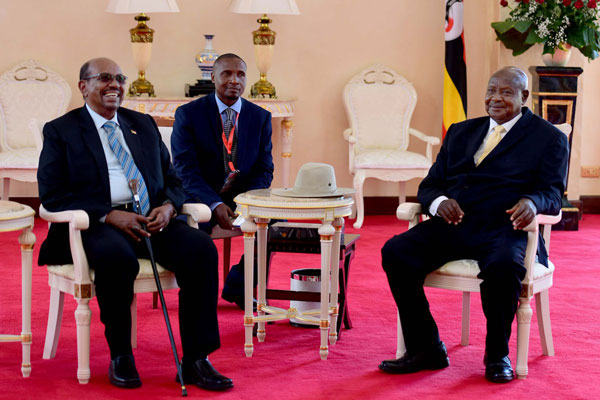
Kampala, Uganda | THE INDEPENDENT & AFP | Improved bilateral relations plus the recent lifting of tough economic and trade sanctions on Sudan look set to improve Uganda-Sudan trade. The coffee and airlines businesses are already reaping, if talks between visiting Sudan President Omar Al-Bashir and host President Yoweri Museveni are anything to go by.
The two presidents on Monday welcomed the designation of Khartoum based TARCO Airlines to start direct flights between Khartoum and Entebbe which will greatly improve connectivity between the two countries and promote trade, tourism and investment.
Air transport will be key to trade between the countries, and the meeting recognised the ongoing collaboration between the Sudan and Uganda standards agencies with regard to quality assurance of coffee exports and stressed the need for value addition.
Sudan imports 20% of Uganda coffee and is the single biggest export market for the product from which about $100 million is earned.
A delegation from the Sudanese Standards and Metrology Organization visited Uganda from November 5-8, 2017 to inspect the coffee testing/quality assurance facilities of Uganda Coffee Development Authority, Uganda National Bureau of Standards (UNBS) and private coffee processors.
Uganda and Sudan have agreed to convene a Joint Investment Conference in Khartoum, on dates to be confirmed, to showcase trade and investment opportunities in both countries with participation of the private sector from the Sudan, Uganda and Arab countries.
Following the lifting of the trade and economic sanctions that had been imposed on the country by the United States for nearly 20 years, Bashir and Museveni called upon the business communities and private sectors to take advantage of this positive development.
During this visit, a Business Forum which brought together the Sudanese Business Delegation and their Ugandan counterparts was held. The forum discussed opportunities for trade and investment particularly in agriculture, agro-processing, manufacturing, pharmaceuticals and commodities especially coffee and tea.
Despite an international war crimes indictment, Bashir has travelled to Uganda, Rwanda and South Africa in the past two years.
US Sanctions lifted on Sudan
The US financial sanctions had put restrictions on international banking transactions, exchange of technology and spare parts, and other cumbersome trade regulations have hampered economic growth.
Hundreds of factories have either closed or barely function, as importing equipment or machine parts directly from manufacturers is cumbersome given the restrictions on transferring funds overseas.
Sudan’s economy suffered a further body blow when the south split from the north in 2011 after a bitter civil war, taking with it the bulk of the country’s oil revenues.
President Omar al-Bashir summarised the situation when he said the US embargo had “weakened the state and its institutions”.
Economic conditions in Sudan have been mired in persistent fiscal deficits, high inflation and the trade embargo imposed by Washington in 1997 over Khartoum’s alleged support for Islamist militant groups.
– ‘Access to new technology’ –
Experts say the lifting of sanctions will help revive Sudan’s dilapidated economy.
“Sudan lost access to new technology, because although the sanctions were imposed by the United States, even Europe and some Asian and Arab countries followed them,” said Mohamed El Nair, professor of economics at Khartoum’s University of El Mughtaribeen.
“Removing sanctions will help Sudan access new technology and international banking, in turn helping better manage its imports and exports.”
Although details of Washington’s decision are awaited, its impact will be felt across several sectors but especially transport, education and healthcare, he said.
Sudan’s aviation sector is expected to benefit hugely, El Nair added, as Airbus and Boeing had refused to provide Sudanese airlines with new planes or spare parts for existing fleets.
Prior to the secession of the south, Sudan used to attract about $5 billion in foreign investments annually. That figure has now slumped to below $2 billion on a moderate economic growth of 3.5 percent in 2016.
 The Independent Uganda: You get the Truth we Pay the Price
The Independent Uganda: You get the Truth we Pay the Price



